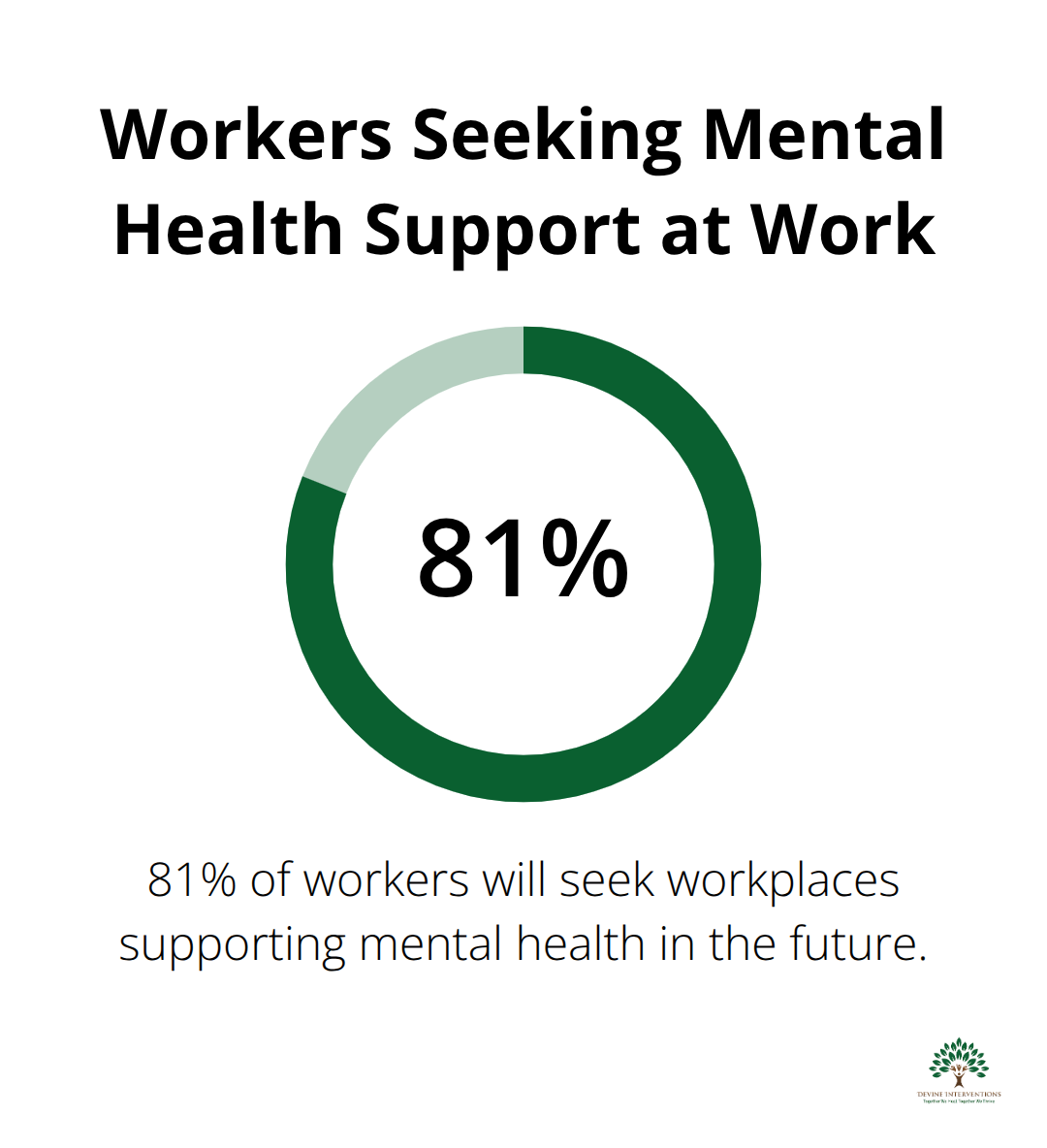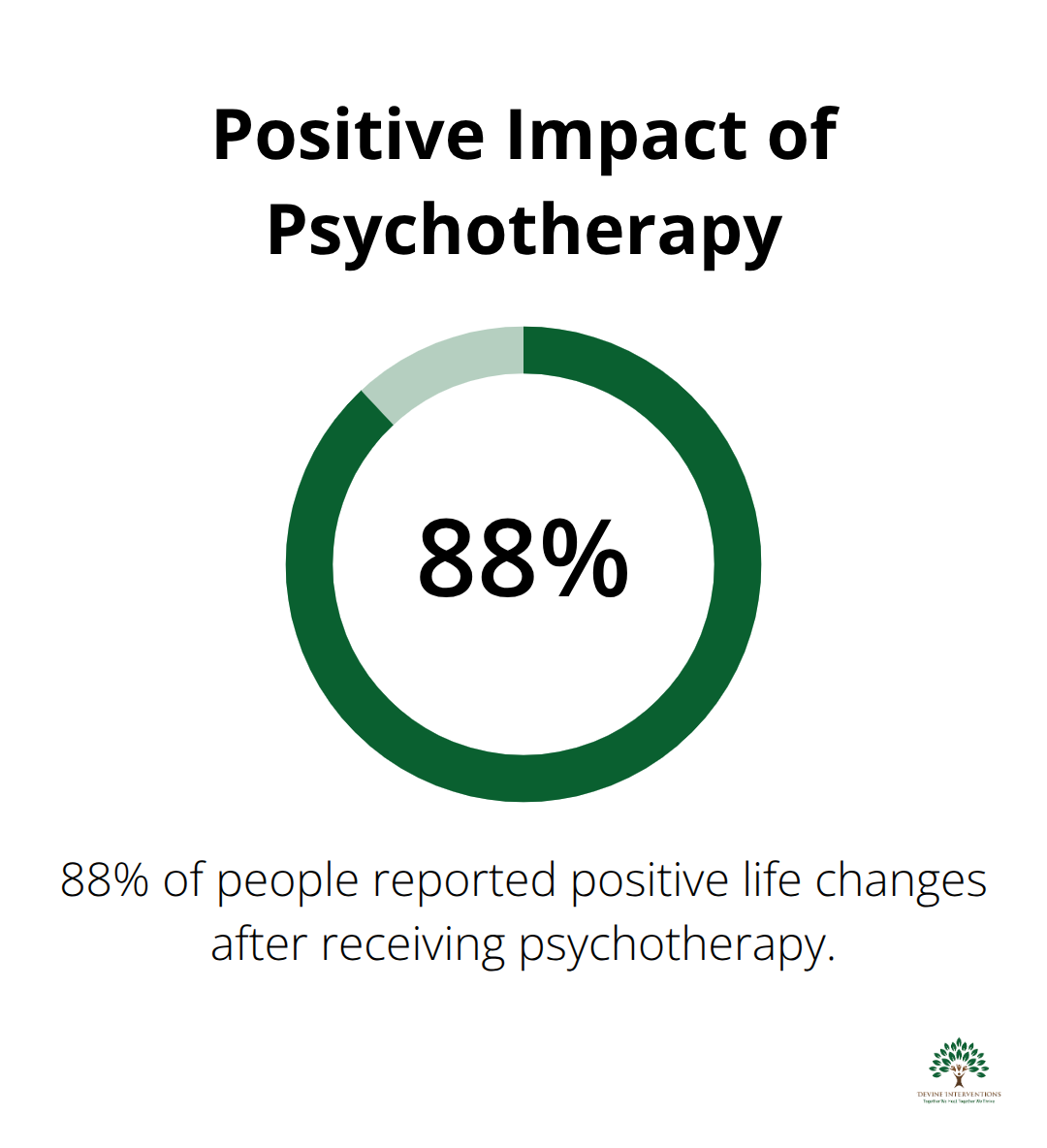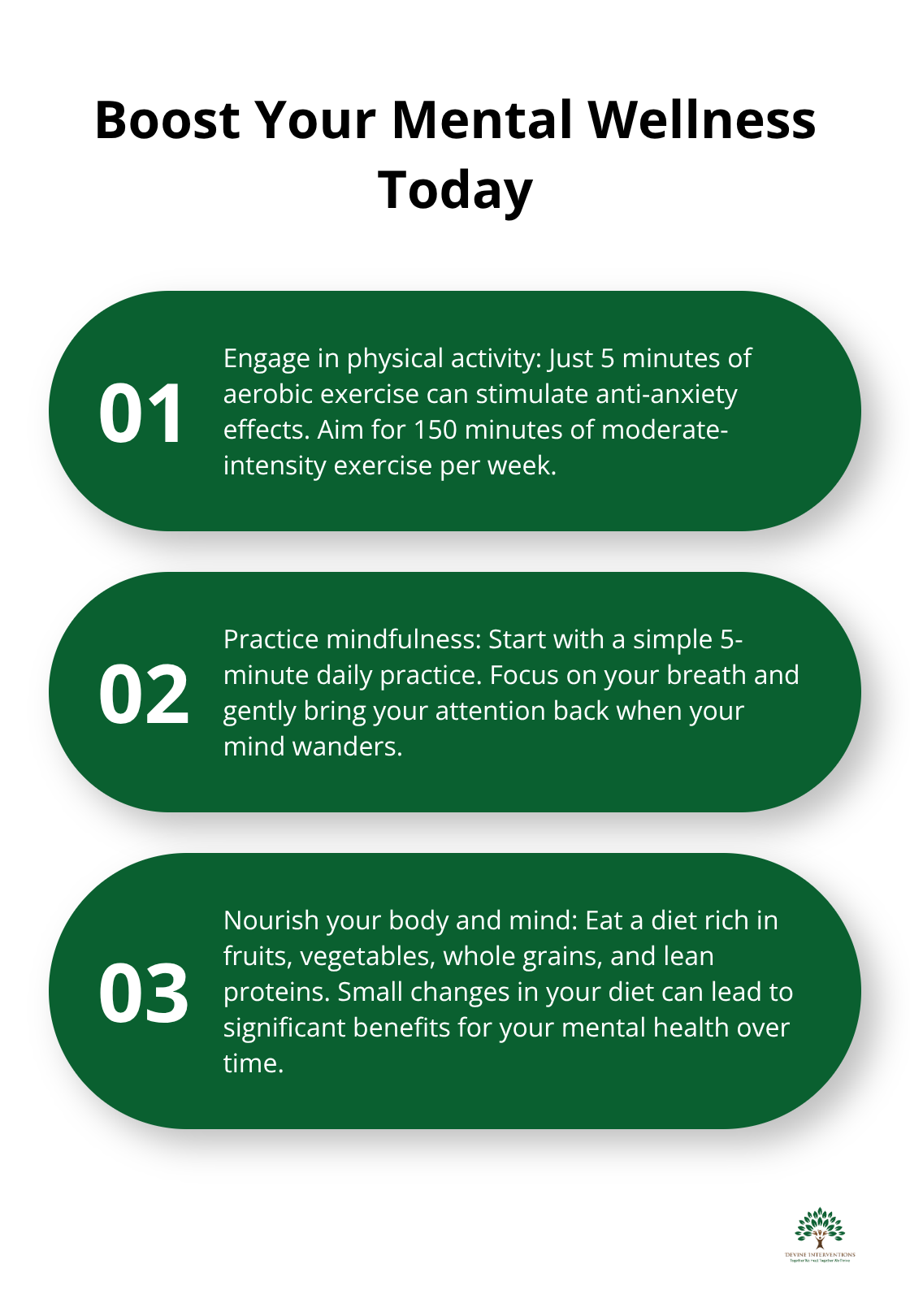Mental wellness is more than just the absence of mental illness. At Devine Interventions, we believe it’s a state of thriving in all aspects of life.
Understanding the mental wellness definition is crucial for achieving overall well-being and happiness. This blog post explores what mental wellness truly means and how you can cultivate it in your daily life.
What Is Mental Wellness?
The Holistic Nature of Mental Wellness
Mental wellness transcends the absence of mental illness. It embodies a state of thriving in all aspects of life. At Devine Interventions, we view mental wellness as an ongoing journey, not a fixed destination.
Mental wellness encompasses your emotional, psychological, and social well-being. It influences your thoughts, feelings, and actions. When you achieve mental wellness, you can tackle life’s challenges, work effectively, and make meaningful contributions to your community.
81% of workers reported that they will be looking for workplaces that support mental health in the future, according to APA’s 2022 Work and Well-being Survey results. This statistic underscores the profound impact of focusing on mental health.

Emotional Stability and Resilience
Emotional stability forms a cornerstone of mental wellness. This doesn’t imply an absence of negative emotions; rather, it involves effective emotion management.
Resilience (your ability to recover from setbacks) plays a vital role in mental wellness. The good news? You can strengthen your resilience. A recent study assessed the impact of a mindfulness program, adapted to the operational constraints of French law enforcement, on participants’ perceived well-being.
Mental Wellness vs. Mental Illness
While mental wellness and mental illness relate to each other, they aren’t opposites. You can experience mental wellness even with a mental illness diagnosis. Conversely, you might be free from mental illness yet struggle with your mental wellness.
Mental illness refers to a health condition that significantly impacts your thinking, emotions, or behavior. It receives a diagnosis based on specific criteria. Mental wellness, however, pertains to your overall psychological well-being.
Cultivating Mental Wellness
To foster mental wellness, you can:
- Practice mindfulness (even 5 minutes a day can make a difference)
- Engage in regular physical activity (a 30-minute walk can boost mood)
- Maintain social connections (quality over quantity matters)
- Seek professional support when needed (it’s a sign of strength, not weakness)
The Role of Professional Support
At Devine Interventions, we address both mental illness treatment and mental wellness promotion. Our approach aims to help you not just survive, but thrive. We offer a range of services (from intensive outpatient programs to individual therapy) designed to support your journey towards better mental health.
As we move forward, let’s explore the key components that contribute to mental wellness and how you can incorporate them into your daily life.
Building Blocks of Mental Wellness
Mental wellness isn’t a one-size-fits-all concept. It’s a dynamic state that requires ongoing effort and attention. Let’s explore the key elements that form the foundation of mental wellness and how you can strengthen them in your daily life.
Emotional Resilience: Your Mental Armor
Emotional resilience is your ability to bounce back from life’s challenges. It’s not about avoiding stress but learning to navigate it effectively. A recent study examined the mediation role of life satisfaction and resilience variables in the relationships between anxiety sensitivity and perceived stress.
To build your emotional resilience:
- Self-reflect: Spend 10 minutes each day journaling about your emotions.
- Challenge negative thoughts: When faced with a setback, ask yourself, “What can I learn from this?”
- Adopt a growth mindset: View challenges as opportunities for growth rather than insurmountable obstacles.
Self-Esteem: The Foundation of Mental Strength
A positive self-image is essential for mental wellness. Research from the University of Basel shows that individuals with high self-esteem are better equipped to handle stress and maintain positive relationships.
Here are practical ways to boost your self-esteem:
- Set achievable goals: Start with small, realistic objectives and celebrate your progress.
- Practice self-compassion: Treat yourself with the same kindness you’d offer a friend.
- Counter your inner critic: When negative self-talk arises, challenge it with evidence of your strengths and accomplishments.
Social Connections: Your Support Network
Healthy relationships are vital for mental wellness. Recent research shows that older adults who are more socially integrated experience lower levels of depression than those with fewer social connections.
To nurture your social connections:
- Schedule regular check-ins with friends and family (even if it’s just a quick text or call).
- Join a community group or class that aligns with your interests.
- Listen actively in your conversations to deepen your connections.
Stress Management: Navigating Life’s Challenges
Effective stress management is a cornerstone of mental wellness. The American Psychological Association reports that chronic stress can lead to serious health problems, including anxiety, insomnia, muscle pain, high blood pressure, and a weakened immune system.
Try these stress-busting techniques:
- Practice mindfulness meditation (start with just 5 minutes a day).
- Engage in regular physical activity (a 30-minute walk can significantly boost your mood).
- Use time-management tools to prioritize tasks and reduce overwhelm.
Professional Support: A Guiding Hand
Sometimes, the path to mental wellness requires professional guidance. A study in the Journal of Counseling Psychology found that 88% of people who received psychotherapy experienced positive changes in their lives.

If you’re struggling, don’t hesitate to reach out to a mental health professional. They can provide personalized strategies and support tailored to your unique needs and circumstances.
As we move forward, let’s explore practical strategies you can implement in your daily life to promote and maintain your mental wellness. These actionable steps will help you build on the foundation we’ve just discussed, creating a robust framework for your ongoing mental health journey.
How Can You Boost Your Mental Wellness Today?
Mental wellness isn’t a distant goal – it’s something you can actively work on right now. Small, consistent actions can lead to significant improvements in mental health. Let’s explore some practical strategies you can implement today to enhance your mental well-being.
Move Your Body, Boost Your Mind
Physical activity is a powerful tool for mental wellness. The American Psychological Association reports that just five minutes of aerobic exercise can stimulate anti-anxiety effects. Start small – a 10-minute walk during your lunch break or a quick yoga session before bed can make a difference.
Try to achieve 150 minutes of moderate-intensity exercise per week. Research has also identified the benefits of mind-body practices, such as yoga and tai chi, and meditation and mindfulness practices. These practices can reduce stress and improve overall well-being.
Mindfulness: Your Mental Wellness Superpower
Mindfulness isn’t just a buzzword – it’s a scientifically proven method to reduce stress and improve mental well-being. A recent study evaluated a freely accessible digital mindfulness programme aiming to improve well-being, mental health and sleep quality.
Start with a simple 5-minute daily practice. Set a timer and focus on your breath. When your mind wanders (and it will), gently bring your attention back to your breathing. Over time, you’ll find it easier to stay present and manage stress more effectively.
Nourish Your Body, Feed Your Mind
The food you eat doesn’t just affect your physical health – it impacts your mental wellness too. A study in the American Journal of Psychiatry found that a diet rich in fruits, vegetables, whole grains, and lean proteins was associated with a lower risk of depression.
Start by making one small change to your diet today. Maybe swap out your afternoon soda for a glass of water, or add an extra serving of vegetables to your dinner. These small changes can add up to significant benefits for your mental health over time.
Prioritize Quality Sleep
Sleep and mental health are closely linked. Poor sleep worsens symptoms of anxiety and depression. Good sleep hygiene dramatically improves mental well-being. The National Sleep Foundation recommends 7-9 hours of sleep per night for adults. If you struggle with sleep, try to establish a consistent bedtime routine. Turn off screens an hour before bed, keep your bedroom cool and dark, and try relaxation techniques like deep breathing or progressive muscle relaxation.
Seek Professional Support
Sometimes these strategies aren’t enough on their own. Professional support can provide personalized strategies tailored to your unique needs. If you feel overwhelmed or struggle to implement these strategies on your own, don’t hesitate to reach out for help. At Devine Interventions, we offer a range of services (from individual therapy to intensive outpatient programs) designed to support your journey towards better mental health.

Final Thoughts
Mental wellness defines a state of thriving in all aspects of life. It encompasses emotional stability, resilience, and the ability to navigate life’s challenges effectively. The mental wellness definition extends beyond the absence of mental illness, emphasizing the importance of ongoing self-care and personal growth.
Professional support plays a vital role in achieving and maintaining mental wellness. At Devine Interventions, we offer services tailored to support your journey towards better mental health. Our approach aims to help you not just survive, but thrive in your daily life.
Your mental wellness journey starts with small, consistent actions. Incorporate mindfulness practices, regular exercise, and healthy eating habits into your routine. Prioritize quality sleep and nurture your social connections. These steps will contribute significantly to your overall well-being and quality of life.







